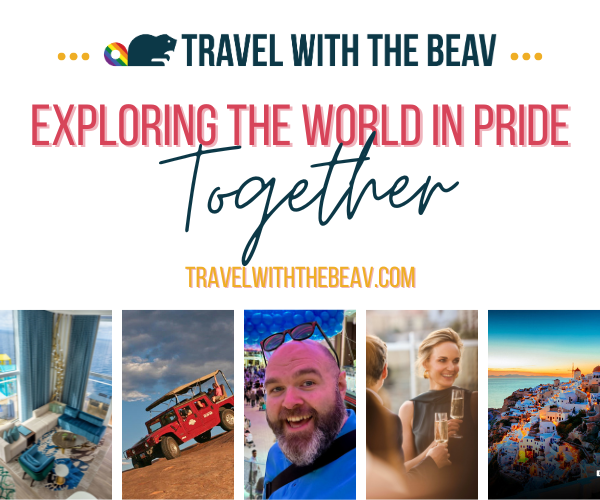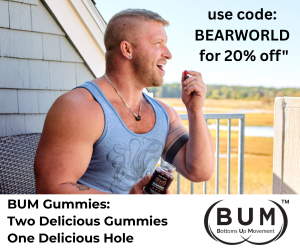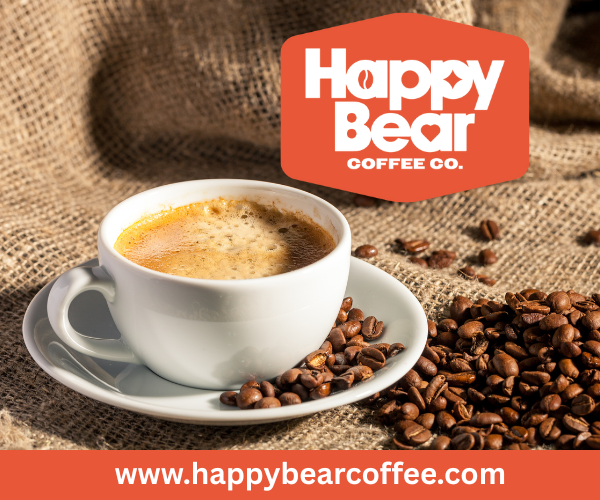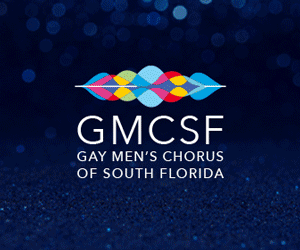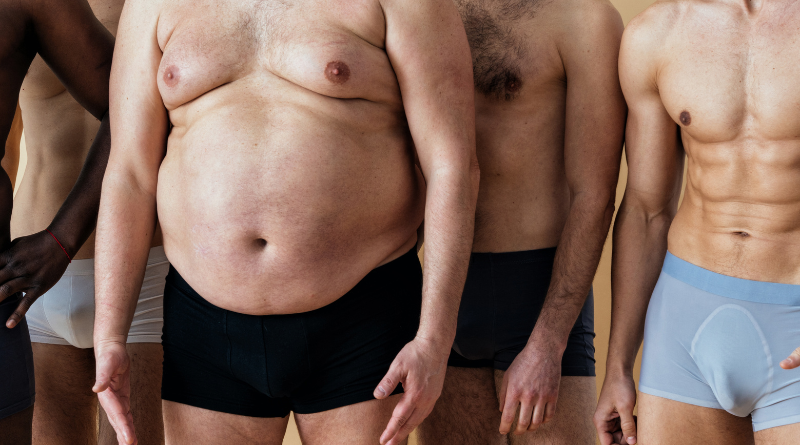
Studying Fat Stigma in UK Bear spaces
A lot of historical Bear writing, captured in wonderful texts like Les Wright’s two Bear Books (1997; 2001), and Ron Suresha’s Bears On Bears (2009), shows that guys often come to Bear communities because they feel OK being bigger and fatter in them. That’s how it was for me, too. My own earliest encounters with ‘Bear’ were back in the late 2000s, when I was in my mid- to late-20s. I had a bit of a beard, and I was pretty fat, and though I didn’t really know much about Bears it seemed like a good slot for me to fit into.
A few years later, when I actually started going to Bear events, I had that experience that so many of us fat guys have in them. For the first time ever in a gay venue, I took my top off. And instead of feeling totally humiliated thanks to my sagging tits and my roll of tummy fat, I felt freed from the weight of my body shame.
It’s the experience that first got me thinking seriously about the role of Bear spaces for fat GBQ guys. And since I’m an academic – specifically a Human Geographer – I wanted to investigate further through research.
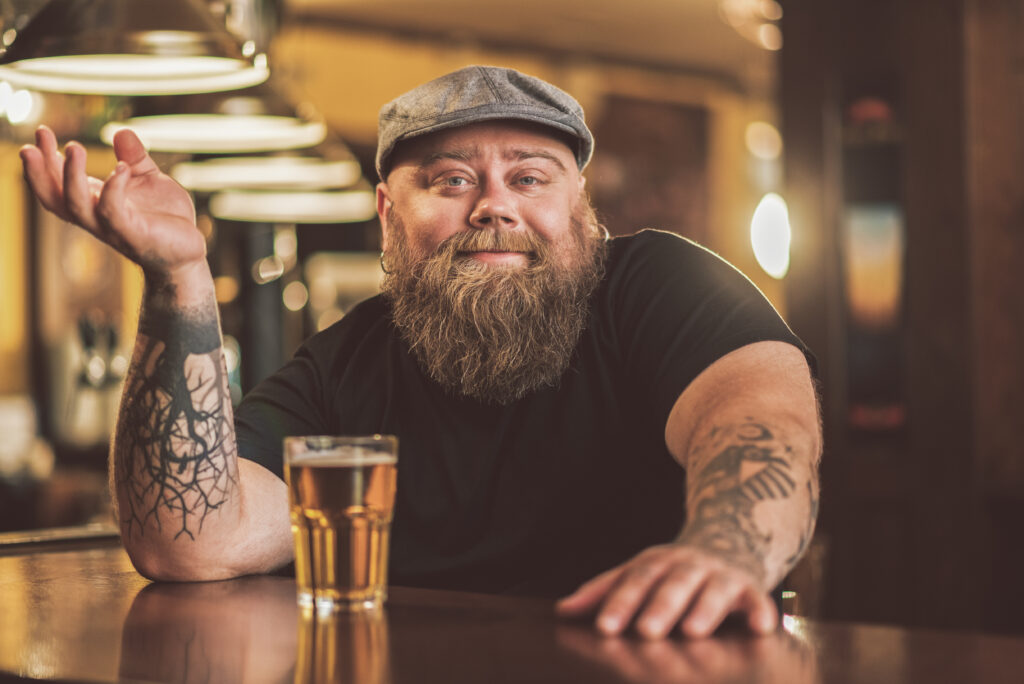
Researching fat GBQ men
My academic work is influenced by this question: How can we make fat people’s lives more liveable, without demanding they lose loads of weight first? We’ve got over a century of well-established research proving that significant, sustained weight loss is both difficult and rare. So regardless of whether or not you think being fat is inherently bad (I don’t), it’s just not reasonable to expect folk to somehow become not-fat if they want a better life.
There’s a sizable body of research and scholarship about fatness along these lines. This scholarship – sometimes positioned in academic fields like Fat Studies and Critical Obesity Studies – focuses not on how to get fat people to lose weight, but on tackling the everyday discrimination, abuse, and inequality that fat people face in most societies. These issues are something everyone who’s fat knows about, but they’re almost never addressed in law or policymaking.
One of the key ideas used in this scholarship is ‘fat stigma’. Theorised by sociologist Erving Goffman, ‘stigma’ helps explain how a person’s entire character can become tainted in the eyes of others through the stain of particular feature – like being fat. We all know how this works. When you’re fat, folk frequently assume you must be lazy, greedy, and selfish. Unwell. Miserable. Smelly, stupid, irresponsible, and bad in bed. Even fat people can have these thoughts about ourselves and others – our entire society trains us to think like this! Fat-supportive scholarship unpicks and challenges these assumptions, and tries to make life better for fat folk.
The bulk of this kind of fat-supportive scholarship has been done by women, for women. And there’s a good reason for that – feminists in particular have long been organised and vocal about how the hatred of fatness has impacted on women. That’s not to say men haven’t been involved, but in general we’ve not organised around or against these issues in the same way, or at the same scale. More and more, though, men do recognise the impacts of fat stigma on ourselves. And as GBQ men, we especially know that our communities, our cultures and our spaces are absolutely riven with body-image issues. Books like Jason Whitesel’s Fat Gay Men (2014) reveal the long history and continuing presence of GBQ men’s obsession with youth and slenderness, and the stigmatisation of fat guys in gay men’s communities.
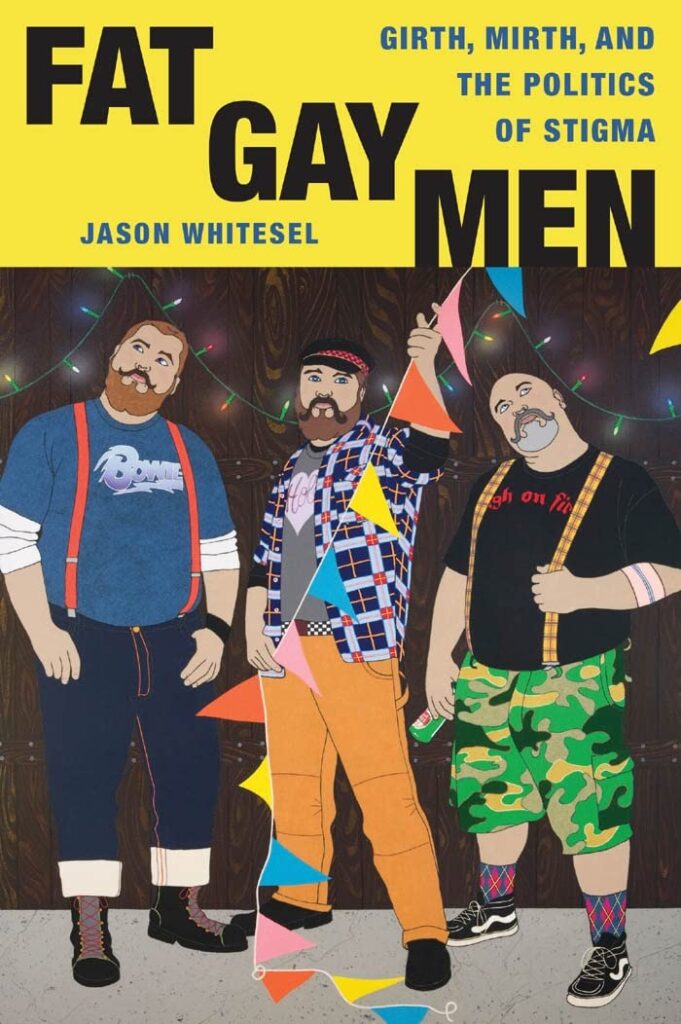
I wanted to know if Bears, and the spaces we create, could be part of tackling fat stigma. My own research was conducted throughout 2018, 2019 and 2020, at five sites in different cities here in the UK. In each city’s Bear space I ran an on-site focus group, conducted some off-site interviews, and also wrote up my own autoethnographic experiences at those sites as a fat Bear myself. After a bit of a delay (thank you COVID…), I’ve been publishing my findings in academic papers and reports. My main focus has been on how UK Bear spaces were experienced by fat guys.
How do fat guys experience UK Bear spaces?
For bigger and fatter guys in my research, the spaces where they felt negatively about their bodies were described as ‘uncomfortable’. Shops where you have to try on and buy clothes – often unstylish and badly-fitted, like so much plus-size clothing. Workplaces and formal events, where you’re expected to wear tight trousers and shirts. And – especially – LGBTQ spaces. Mainstream LGBTQ spaces like bars and clubs were often described as uncomfortable for fat guys.
At first, the reason for this wasn’t clear. For sure, some fat guys described experiences of open verbal abuse for being fat in LGBTQ spaces. And others talked about more subtle exclusions, like getting ‘looks’ and ‘comments’ – wee things that made them feel like they weren’t welcome. But overall guys were actually pretty unsure about exactly why they felt uncomfortable in mainstream LGBTQ spaces – they couldn’t quite say.
I was able to review all the times in my dataset when guys described being in mainstream LGBTQ spaces. What jumped out at me was the idea of bodies that ‘stand out’. In mainstream LGBTQ spaces, bigger and fatter guys often found themselves surrounded by much slimmer bodies. Even if these slimmer people weren’t saying or doing anything negative, just their very presence – just being there! – made bigger guys hyper-aware of their own size and feel that that they visibly stood out as fat.
On the flipside, Bear spaces were usually described as ‘comfortable’ for fat guys, often explicitly in opposition to mainstream LGBTQ spaces. Here, guys tended to be surrounded by lots of fairly similar body types – not exactly the same, but definitely tending towards the bigger and the fatter. Amongst these bodies, bigger guys didn’t really stand out as notably fat. Instead, their bodies fit in. This was the biggest thing that made Bear spaces feel ‘comfortable’ for fat guys.
Is there still fat stigma in UK Bear spaces?
These positive, ‘comfortable’ experiences aren’t universal. First, some Bear spaces are dominated by trimmer bodies – and these Bear spaces, as we might now predict, were felt to be much less comfortable by fat guys. Second, there’s still some open anti-fat abuse in Bear spaces – this seems fairly rare, but it does happen, and in my research, it tended to come from trimmer and more muscular Bears. That’s not to say Muscle Bears or slimmer guys are always fatphobic. Plenty of them are warmly welcoming of fat guys. Some are fat themselves, and some want to fuck fat guys! And even some fat guys can and do make negative comments about other fat guys.
But I discovered a more subtle, more insidious manifestation of fat stigma in Bear spaces. The two previous examples (domination of trimmer bodies, and open anti-fat attitudes) challenge fat guys’ comfort in Bear spaces. But this third example actually supports the comfort of most fat guys. Because this manifestation of fat stigma is: fat guys feel comfortable when they’re not the fattest guy present. When we get to ‘fit in’, that means the biggest guy is the one who now ‘stands out’. And we feel comfortable because even though we’re fat, we’re not as fat as that other guy.
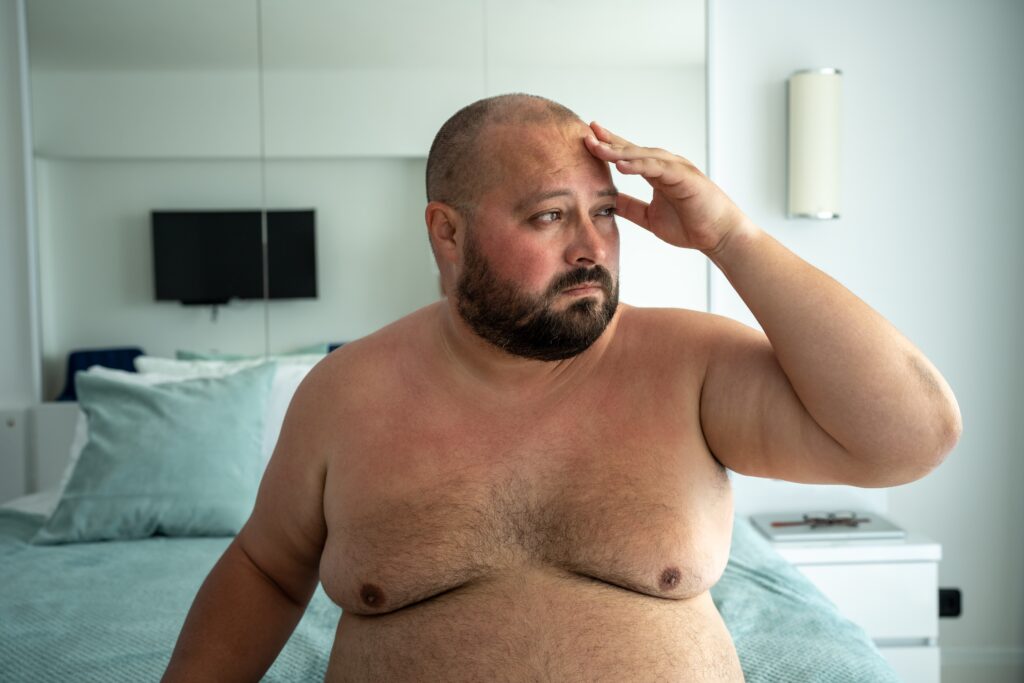
Guys throughout my dataset described this comparison – but even I felt this, and feel this. It’s embarrassing. When I went back and read through my many, many pages of autoethnographic notes on my Bear space experiences, I was shocked to see they were full of off-the-cuff comments about not being the fattest guy there. That I was relieved because there were ‘much fatter lads than me’, and so ‘my belly looked alright’ in comparison.
I wasn’t really aware that I was making these comments – they were made during my long, rambling audio recordings immediately before, during, and after my visits. Given that the whole point of my research has been to make life better for fat guys, to support fat guys, reading these comments made me properly squirm. To realise that part of me is pleased, relieved, comforted that I’m slimmer than some guys in Bear spaces. That I’m not the fattest. That’s fat stigma right there – something in me still instinctively sees fatness as to be avoided, and recognises that ‘the fattest guy’ is what I don’t want to be.
How can we tackle fat stigma as Bears?
I don’t really know what to do about this. In an issue of BWM that celebrates fat guys, I know that this article is probably a downer. I know it might even make things worse for a lot of fat guys. Is reading this article gonna make some guys become newly hyper-aware of their bodies in Bear spaces? Are some guys, having read this, gonna feel awful if they suddenly realise they’re the fattest guy there?
I know that I’m not gonna solve the intense, omnipresent stigmatisation of fatness in one magazine article (or a bunch of academic papers, or a book). The only advice I can suggest is that we take the insidious pervasiveness of fat stigma seriously. This means, firstly, not just labelling spaces ‘body-positive’ or ‘fat-inclusive’ and leaving it at that. Since a lot of fat guys’ comfort is about being surrounded by other fat guys, your space can’t be ‘fat-inclusive’ if you don’t have a lot of fat folk there! And secondly, it means those of us who’re less fat need to acknowledge that we passively benefit from fat stigma, when it makes us feel better about our bodies in Bear spaces. We don’t need to play the blame game (“It’s all the Muscle Bears’ fault!”) or get bogged down in hand-wringing confessions (“I acknowledge my privilege” etc etc). Instead, we need to think about how we can actively support, champion and celebrate our biggest boys. For organisers in particular, it should mean not hiding fat guys away in adverts and promotions like some shameful secret. For the rest of us, it might mean taking a leaf out of feminist fat activism and bringing our support for fat people outside of Bear spaces and into the wider world. At a minimum, we can be aware of and challenge our own negative thoughts about fat people and speak up against casual anti-fat chat in our everyday lives. Good places to learn more would be Charlotte Cooper’s book Fat Activism (2016), or blogs like Aubrey Gordon’s Your Fat Friend (https://www.yourfatfriend.com/).
I want to thank all of the guys who took part in my research, and also the organisers of Manbears, Brit Bears, BearScots, Brighton Bear Weekend, and Belfast Bears for hosting and supporting my research. If you’d like to read more of my work, check out my public research profile (https://research.brighton.ac.uk/en/persons/nicholas-mcglynn) where can download my Bearspace Findings Report and its 2-page Community Summary, plus free versions of my peer-reviewed academic papers on Bears and LGBTQ communities. My upcoming book, Bodies & Boundaries of UK Bear Spaces, develops my thinking about Bear identities and communities further – look for it in Spring/Summer 2024.

